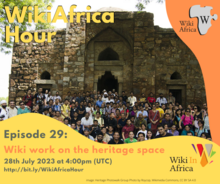GLAM/Newsletter/July 2023/Contents/Wiki Loves Living Heritage report
|
Join Wiki Loves Living Heritage at Wikimania!
Spotlight
The crossing paths of Living Heritage and Wikimedia are explored at Wikimania's opening session on 17 August. Dr. Kirk Siang Yeo, the Senior Director of Heritage Policy at the National Heritage Board (NHB) of Singapore, shares his insights and experiences on how to safeguard and promote intangible cultural heritage in the digital age. He will discuss the challenges and opportunities for collaboration and innovation in the field of intangible cultural heritage, and how to engage and empower communities in the research and promotion of their cultural heritage.
Following the spotlight presentation, Susanna Ånäs and Alan Ang will present Wiki Loves Living Heritage in a session that is part of the Bazaar series. They are events that are meant to bring people together to be inspired by each others' projects and to start collaborating with one another.
Photo contests around the world
The photo competition Wiki Loves Living Heritage in Singapore was arranged in partnership with the National Heritage Board of Singapore and the National Youth Achievement Award. It invited everyone from Singapore to participate in sharing the tangible and intangible heritage of Singapore on Wikimedia Commons. The top 10 contestants will get their work featured during Wikimania 2023, and the winning 3 images will be selected by community voting during the event. At the closing ceremony on 19 August, the winners of the photography competition will be announced and all the top contestants will be presented with their plaques and certificates. See the images in the Wikimedia Commons category.

In India, the photography contest Living Heritage through your lens is organized by Contact Base, a social enterprise working across India with a mission to foster inclusive and sustainable development using culture-based approaches, for the protection of rights of women, children and indigenous people.
In Europe, the European Network of Focal Points for the UNESCO 2003 Convention organizes a campaign looking at the safeguarding practices: Wiki Loves Safeguarding Living Heritage in Europe runs from 5th of June to 15th of September 2023
Local photo contests are ongoing also at least in Belgium, Finland, and Austria. Documentation projects such as Wir machen blau! created in collaboration between Wikimedia Austria and the Austrian Commission for UNESCO show how to combine photographic documentation, writing articles and being together.
Gopichandra's Panchali

A completely different documentation activity is proofreading works of oral literature. The West Bengal Wikipedia's User Group are running a contest which has now resulted in the completion of proofreading Gopichandra's . It is one of the many folk songs related to a king Gopichandra, who is said to rule the eastern part of Bengal region around 11th century AD. This particular song was collected from Chittagong region in early 20th century from manuscripts attributed to a poet named Bhabanidas and was edited by Dinesh Chandra Sen and Basanta Ranjan Roy. Thanks to the efforts of User:Nettime Sujata, the entire text has been transcribed and proofread on Bengali Wikisource with around 2500 footnotes added by the editors.
If you run projects related to living heritage anywhere in the world, please register them on the website!
It's all based on data
Living heritage inventories maintained by the national authorities contributing to the UNESCO Lists and registers of Intangible Cultural Heritage are the backbone of Wiki Loves Living Heritage. Wikimedians and the focal points are coming together around the world to gradually include basic information about the heritage elements to Wikidata.
When the data is on Wikidata, it can be used to power lists of elements on wiki pages, create intelligent upload links or translation launchpads, for example. We captured the state of the data imported to Wikidata at the moment.
-
For the gray countries, we have not identified an inventory. For light blue we have, but they have not been added to Wikidata, usually because we do not have enough verified information. The countries in darker blue have at least one inventory in Wikidata. The yellow bubbles show additionally the amounts of heritage elements that have been added. Spain has by far the most inventories: Thanks to User:Olea, we have 38 inventories in our records, out of which 23 have been added to Wikidata, and collectively they have 1890 records in Wikidata.
-
The second graph show the increase of articles about living heritage over the course of the project. The more we identify items as living heritage the more Wikipedia articles are in the scope. Some of the articles may exist already and others are created during the project.
French Wikipedia has the most articles about living heritage. Turkish Wikipedia has seen a tremendous boost earlier this year, and currently the Armenian Wikipedia’s articles on living heritage are increasing fastest.
WikiAfrica Hour

Susanna Ånäs and Sadik Shahadu visited WikiAfrica Hour to introduce Wiki Loves Living Heritage in the session about Wiki work on the heritage space. The recording is available on YouTube.
Wiki Loves Living Heritage starts publishing on Mastodon

Follow @wikiloveslivingheritage@wikis.world on Mastodon! We will continue publishing on Twitter/X for the time being as well.
Mastodon is a free and open-source, self-hosted, and federated social network service. The network consists of independent, but linked services (nodes/servers/instances) that communicate with each other. The rules for tolerating different content and behavior vary between the nodes. Wiki Loves Living Heritage joined the wikis.world service created for the Wikimedia community.




